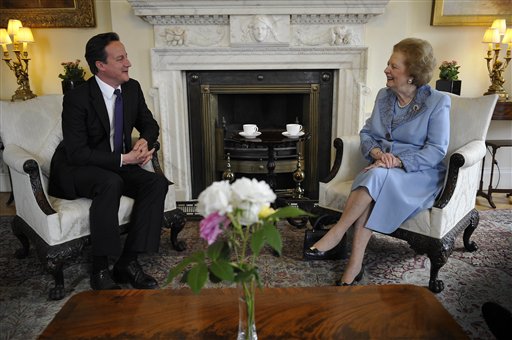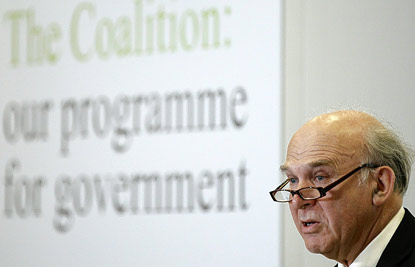9 June, 2010
When I helped Labour with this Eddie Izzard video for the election, I worried a little about the baldness of the ‘same old Tories/Thatcher’s Children’ line. I felt the Tories were probably a bit more reconstructed, a bit more compassionate, than they were being given credit for. I confess I was sold, just a teeny bit, on the notion of the ‘modern Conservative Party,’ as David Cameron kept calling it. I wondered how right it was to hark back to the folk-memory of the 1980s. Was the retro attack necessary?
It’s good to talk
On Monday, Mr Cameron stood up to warn us just how bad things were going to get, cuts-wise. I liked one aspect of it. I liked the fact that he wants to have a dialogue with the nation about economics. That has to be a good thing. Mind you – without checking the media forensically – it seems to me that there isn’t much debate going on about overall economic strategy. There is, however, quite a bit of chat about ‘what could go’; micro-debate which tacitly accepts that the overall argument for austerity measures has been won, and focusses instead on whether or not ministerial walking to work actually saves money, or whether the St George flag can be run up the flagpole during the World Cup for minimal cost.
At least David Cameron entertained the macro debate on economic policy, and we don’t get much of that in the UK. But, while it’s good to talk, unfortunately, the content of his argument – as opposed to the fact of it – really bothered me. And, though I was planning to comment less on politics, as this dismal week rolls on, I’m feeling more and more bothered.
Do you really want to hurt me?
Cameron harangued Labour again. So much for the New Politics the Coalition promised us. Every time these guys open their mouths, it is to slam Labour. Is it that they really want to hurt us, or is it that Labour are a soft target at the moment? I’m beginning to wonder whether it was right to create such a long campaign window for the leadership election. We need a new leader to marshall a proper Opposition, fast.
Gold!
Mr Cameron gave the impression that, now he’s looked under the bonnet, the country is in a bigger mess than he realised. He said hitherto unpublished Treasury figures revealed Britain could be facing an annual interest bill of £70bn on debt in 2015. He struck gold finding that figure. Has anybody got the detail on it? It probably has a dozen assumptions built into it – e.g. borrowing continuing to grow, interest rates rising, blah blah. Especially as this was the only new figure he revealed, we need the detail behind it. I haven’t seen anybody explaining or challenging this number. But I’d bet the Treasury has any number of worst-case forecasts for 2015, and that this is only one doomsday scenario. And there may well be any number of rosy scenarios too, in the same Treasury vaults.
In the absence of detail for a projected figure, it’s a shame he made no mention of the latest actual figures, which showed that borrowing in fact came in many billions less than forecast. See my earlier comment. Nor did Mr Cameron mention that growth results came in (slightly) above forecast.
What he did say was that the impending cuts are going to be very bad, and would affect every man, woman and child in this country. It was sobering stuff, and gave some commentators the willies. Playing sweetly into the Tories’ hands, they asked “does this mean all bets are off? All the ring-fencing you promised during the election – all those promises? You can’t keep them now, can you?”
I’m sorry, but I want to see more evidence than this putative “£70bn in 2015” figure before I let anybody off the hook on their election promises.
You’ve got an -ology!?
Once he had frightened us all with the £70bn figure, Cameron relaxed into his ideological position, repeatedly quoting the contraction in the private sector relative to the public sector.
“And while private-sector employment fell in this period (since 2007) by 3.7%, public-sector employment actually rose. So it has been, if you like, a tale of two economies: a public-sector boom and a private-sector bust”
For Cameron, this is self-evidently wrong. The private sector, in his world-view, is the ‘real’ economy, and the public sector is somehow phoney and unreal, even immoral. The public sector crowds out the private one. It is a cancer that needs to be cut out. Just like a cancer, it needs early radiotherapy:
“And now, today, we’re all paying the price because the size of the public sector has got way out of step with the size of the private sector. We’re going to have to try and get it back in line and that will be much more painful than if we had kept things properly in balance all along.”
Cameron really thinks this is truth, not ideology.
“We are not doing this because we want to. We are not driven by some theory or some ideology. We are doing this as a government because we have to, driven by the urgent truth…”
But anyone who has even a basic knowledge of the dividing lines between economists will know that it is indeed a question of ideology. Any economist will tell you that in a recession the private sector will contract faster than the state sector; that is inevitable. Any Keynesian economist will tell you it is also desirable – it is beneficial that the state sector stays large to compensate for the private sector running scared. Indeed the same economist is likely to tell you that the goverment should deliberately expand its spending for the same reason. It’s nothing new. It’s called fiscal stimulus. When markets collapse, guess what? We need governments to intervene.
Cameron would have us believe that government is, axiomatically, the problem. It’s a story that only really plays for the fit, the strong, the economically self-reliant. Fine if that’s you. Fine if you’ll always be that way and never need help. Fine if you live in a gated community away from others not so lucky. For the rest of us, it’s a horrible and frightening piece of ideology.
Ashes to ashes
The ‘sovereign debt crisis’ is the perfect excuse to abandon the compassion the Tories espoused under Cameron in opposition. It has an ash-cloud quality to it; it feels as if it is some external thing we have no choice but to respond to; it is the unavoidable reality of the international market in government debt. Chin up, Dunkirk spirit; we can’t fly for a bit, but we’ll survive. Where Labour failed to convince the nation that the global economic meltdown was exogenous, despite it being true, the Coalition seems to be able to appeal to the global markets and get away with it. They are defter politicians than Labour under Brown. They seem to have convinced us that unless we cut off our own legs, the global financial markets will do it for us, and take our arms for good measure.
“The global financial markets are no longer focusing simply on the financial position of the banks. They want to know that the governments that have supported the banks over the last 18 months are taking the actions to bring their own finances under control.”
I’m not entirely sure it’s true. Whilst my friend in the hedge fund game tells me the markets fear that if governments aren’t reliable, ‘there’s nowhere left to run’, I can’t help wondering what will happen if all Western economies vie for pole position in the self-flagellation stakes. Investors have to invest somewhere; assuming we all take the same action, relatively speaking nothing will change. It’s only if other nations do it and we don’t that we’ll become relatively less attractive. There’s an element of ‘satisfying the markets’ that’s like a financial nuclear arms race; cripplingly costly, and hard to justify to our children.
What’s true, and terrifying, is that the mood in Europe, the mood of the G20 and the IMF – until now laudably pro-stimulus – is beginning to swing towards panic and retrenchment. (Notice, by the way, how the Tories seize upon this shift – exaggerating a modest change of language in Osborne’s favour at the Korea meeting – without realising they are exposing just how isolated they were on the economy only weeks ago.) Nerve, it seems, is not going to be held. If everyone caves and rushes to slash their budgets in an austerity race, nobody will be able to export their way out of recovery. Other countries won’t be buying. At the same time, domestic demand will contract as net government spending reduces. No one to sell to, home or abroad. The interlinked economies of Europe and the Western world will wilt together like so many flowers in a field.
Do you really want to make me cry?
Presumably, if the Tory ideology is correct, this won’t matter. As long as the dirty bathwater goes – that nasty, polluted, immoral state spending on doctors, nurses, hospitals, child tax credits, Sure Start, pensions, tv licences for the over 75s – flush all that away, then the pain will have been worthwhile.
The 1980s are back. Be afraid, as Eddie Izzard says. Be very afraid.



